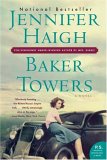Summary | Excerpt | Reading Guide | Reviews | Readalikes | Genres & Themes | Author Bio

She sewed sleeves at the Bakerton Dress Company,
a low brick building at the other end of town. Each morning Rose watched the
neighborhood women tramp there like a civilian army. A few even wore trousers,
their hair tied back with kerchiefs. What precisely they did inside the factory,
Rose understood only vaguely. The noise was deafening, Dorothy said; the floor
manager made her nervous, watching her every minute. After seven months she
still hadn’t made production. Rose worried, said nothing. For an unmarried
woman, the factory was the only employer in town. If Dorothy were fired she’d
be forced to leave, take the train to New York City and find work as a housemaid
or cook. Several girls from the neighborhood had done this—quit school at
fourteen to become live-in maids for wealthy Jews. The Jews owned stores and
drove cars; they needed Polish-speaking maids to wash their many sets of dishes.
A few Bakerton girls had even settled there, found city husbands; but for
Dorothy this seemed unlikely. Her Polish was sketchy, thanks to Stanley’s
rules. And she was terrified of men. At church, in the street, she would not
meet their eyes.
Rose laid the baby down. Every morning she
carried the heavy cradle downstairs to the kitchen, the warmest room in the
house. From upstairs came the sounds of an argument, the younger children
getting ready for school.
She went into the parlor and stood at the foot of
the stairs. "Joyce!" she called. "Sandy!"
Her younger daughter appeared on the stairs,
dressed in a skirt and blouse.
"Where’s your brother?"
"He isn’t ready." Joyce ran a hand
through her fine hair, blond like her father’s; she’d inherited the color
but not the abundance. "I woke him once but he went back to sleep."
"Sandy!" Rose called.
He came rumbling down the stairs: shirt
unbuttoned, socks in hand, hair sticking in all directions.
"See?" Joyce demanded. She was six
years older, a sophomore in high school. "I have a test first period. I can’t
wait around all day."
Sandy sat heavily on the steps and turned his
attention to his socks. "I’m not a baby," he grumbled. "I can
walk to school by myself." He was a good-humored child, not prone to
sulking, but he would not take criticism from Joyce. His whole life she had
mothered him, praised him, flirted with him. Her scorn was intolerable.
Joyce swiped at his hair, a stubborn cowlick that
refused to lie flat. "Well, you’re not going anywhere looking like
that."
He shrugged her hand away.
"Suit yourself," she said, reddening.
"Go to school looking like a bum. Makes no difference to me."
"You go ahead," Rose told Joyce.
"I take him." He couldn’t be trusted to walk alone. The last time
she’d let him he’d arrived an hour late, having stopped to play with a stray
dog.
He followed her into the kitchen. Of all her
children he was the most beautiful, with the same pale blue eyes as his father.
He had come into the world with a full head of hair, a silvery halo of blond.
They’d named him Alexander, for his grandfather; it was Joyce who shortened
the name to Sandy. As a toddler, she’d been desperately attached to a doll she’d
named after herself; after her brother was born she transferred her affections
to Sandy. "My baby!" she’d cry, outraged, when Rose bathed or nursed
him. In her mind, Sandy was hers entirely.
Rose scooped the last of the oatmeal into a bowl
and poured the boy a cup of coffee. Each morning she made a huge potful, mixed
in sugar and cream so that the whole family drank it the same way. In the
distance the fire whistle blew, a low whine that rose in pitch, then welled up
out of the valley like a mechanical scream.
"What is it?" Sandy asked. "What
happened?"
"I don’t know." Rose stared out the
window at the number three tipple rising in the distance. She scanned the
horizon for smoke. The whistle could mean any number of disasters: a cave-in, an
underground fire. At least once a year a miner was killed in an explosion or
injured in a rockfall. Just that summer, a neighbor had lost a leg when an
underground roof collapsed. She crossed herself, grateful for the noise in the
basement, her husband safe at home. This time at least, he had escaped.
The foregoing is excerpted from Baker Towers by Jennifer Haigh. All rights reserved. No part of this book may be used or reproduced without written permission from HarperCollins Publishers, 10 East 53rd Street , New York , NY 10022
Your guide toexceptional books
BookBrowse seeks out and recommends the best in contemporary fiction and nonfiction—books that not only engage and entertain but also deepen our understanding of ourselves and the world around us.